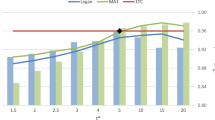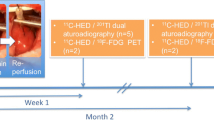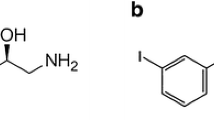Abstract
Purpose
Although 11C-hydroxyephedrine (11C-HED) PET is used to map cardiac sympathetic innervation, no studies have shown the feasibility of quantitation of 11C-HED PET in small- to medium-sized animals. Furthermore, its relation to 123I-MIBG uptake, the most widely used sympathetic nervous tracer, is unknown. The aims of this study were to establish in vivo sympathetic nerve imaging in rabbits using 11C-HED PET, and to compare the retention of 11C-HED with that of 123I-MIBG.
Methods
Twelve rabbits were assigned to three groups; control (n=4), chemical denervation by 6-hydroxydopamine (6-OHDA) (n=4) and reserpine treated to inhibit vesicular uptake (n=4). After simultaneous injection of 11C-HED and 123I-MIBG, all animals underwent dynamic 11C-HED PET for 40 min with arterial blood sampling. The 11C-HED retention fraction and normalised 11C-HED activity measured by tissue sampling were compared with those measured by PET.
Results
Both the 11C-HED retention fraction and the normalised 11C-HED activity measured by PET correlated closely with those measured by tissue sampling (R=0.96027, p<0.001 and R=0.97282, p<0.001, respectively). Inhibition study by 6-OHDA resulted in a significant reduction in retention (90%) for both 11C-HED and 123I-MIBG. Reserpine pretreatment reduced 11C-HED retention by 50%, but did not reduce 123I-MIBG retention at 40 min after injection.
Conclusion
Non-invasive quantitation of cardiac sympathetic innervation using 11C-HED PET is feasible and gives reliable estimates of cardiac sympathetic innervation in rabbits. Additionally, although both 11C-HED and 123I-MIBG are specific for sympathetic neurons, 11C-HED may be more specific for intravesicular uptake than 123I-MIBG in some situations, such as that seen in reserpine pretreatment.





Similar content being viewed by others
References
Rosenspire KC, Haka MS, Van-Dort ME, Jewett DM, Gildersleeve DL, Schwaiger M, et al. Synthesis and preliminary evaluation of carbon-11-meta-hydroxyephedrine: a false transmitter agent for heart neuronal imaging. J Nucl Med 1990;31:1328–1334
Schwaiger M, Kalff V, Rosenspire K, Haka MS, Molina E, Hutchins GD, et al. Noninvasive evaluation of sympathetic nervous system in human heart by positron emission tomography. Circulation 1990;82:457–464
Di-Carli MF, Tobes MC, Mangner T, Levine AB, Muzik O, Chakroborty P, et al. Effects of cardiac sympathetic innervation on coronary blood flow. N Engl J Med 1997;336:1208–1215
Ungerer M, Hartmann F, Karoglan M, Chlistalla A, Ziegler S, Richardt G, et al. Regional in vivo and in vitro characterization of autonomic innervation in cardiomyopathic human heart. Circulation 1998;97:174–180
Stevens MJ, Raffel DM, Allman KC, Dayanikli F, Ficaro E, Sandford T, et al. Cardiac sympathetic dysinnervation in diabetes: implications for enhanced cardiovascular risk. Circulation 1998;98:961–968
Bengel FM, Ueberfuhr P, Schiepel N, Nekolla SG, Reichart B, Schwaiger M. Effect of sympathetic reinnervation on cardiac performance after heart transplantation. N Engl J Med 2001;345:731–738
Schmid H, Forman LA, Cao X, Sherman PS, Stevens MJ. Heterogeneous cardiac sympathetic denervation and decreased myocardial nerve growth factor in streptozotocin-induced diabetic rats: implications for cardiac sympathetic dysinnervation complicating diabetes. Diabetes 1999;48:603–608
Jayachandran JV, Sih HJ, Winkle W, Zipes DP, Hutchins GD, Olgin JE. Atrial fibrillation produced by prolonged rapid atrial pacing is associated with heterogeneous changes in atrial sympathetic innervation. Circulation 2000;101:1185–1191
Wolpers HG, Nguyen N, Rosenspire K, Haka M, Wieland DM, Schwaiger M. C-11 hydroxyephedrine as marker for neuronal catecholamine retention in reperfused canine myocardium. Cor Art Dis 1991;2:923–929
Wieland DM, Brown LE, Rogers WL, Worthington KC, Wu JL, Clinthorne NH, et al. Myocardial imaging with a radioiodinated norepinephrine storage analog. J Nucl Med 1981;22:22–31
Stanton MS, Tuli MM, Radtke NL, Heger JJ, Miles WM, Mock BH, et al. Regional sympathetic denervation after myocardial infarction in humans detected noninvasively using I-123-metaiodobenzylguanidine. J Am Coll Cardiol 1989;14:1519–1526
Simmons WW, Freeman MR, Grima EA, Hsia TW, Armstrong PW. Abnormalities of cardiac sympathetic function in pacing-induced heart failure as assessed by [123I]metaiodobenzylguanidine scintigraphy. Circulation 1994;89:2843–2851
Merlet P, Valette H, Dubois-Rande JL, Moyse D, Duboc D, Dove P, et al. Prognostic value of cardiac metaiodobenzylguanidine imaging in patients with heart failure. J Nucl Med 1992;33:471–477
Imamura Y, Ando H, Mitsuoka W, Egashira S, Masaki H, Ashihara T, et al. Iodine-123 metaiodobenzylguanidine images reflect intense myocardial adrenergic nervous activity in congestive heart failure independent of underlying cause. J Am Coll Cardiol 1995;26:1594–1599
Matsunari I, Schricke U, Bengel FM, Haase HU, Barthel P, Schmidt G, et al. Extent of cardiac sympathetic neuronal damage is determined by the area of ischemia in patients with acute coronary syndromes. Circulation 2000;101:2579–2585
Simoes MV, Barthel P, Matsunari I, Nekolla SG, Schomig A, Schwaiger M, et al. Presence of sympathetically denervated but viable myocardium and its electrophysiologic correlates after early revascularised, acute myocardial infarction. Eur Heart J 2004;25:551–557
Yoshikawa T, Handa S, Suzuki M, Nagami K. Abnormalities in sympathoneuronal regulation are localized to failing myocardium in rabbit heart. J Am Coll Cardiol 1994;24:210–215
Somsen GA, Dubois EA, Brandsma K, de Jong J, van der Wouw PA, Batink HD, et al. Cardiac sympathetic neuronal function in left ventricular volume and pressure overload. Cardiovasc Res 1996;31:132–138
Liu JL, Zucker IH. Regulation of sympathetic nerve activity in heart failure: a role for nitric oxide and angiotensin II. Circ Res 1999;84:417–423
Anzai T, Yoshikawa T, Baba A, Nishimura H, Shiraki H, Nagami K, et al. Myocardial sympathetic denervation prevents chamber-specific alteration of beta-adrenergic transmembrane signaling in rabbits with heart failure. J Am Coll Cardiol 1996;28:1314–1322
Watanabe M, Okada H, Shimizu K, Omura T, Yoshikawa E, Kosugi T, et al. A high resolution animal PET scanner using compact PS-PMT detectors. IEEE Trans Nucl Sci 1997;44:1277–1282
Nekolla SG, Miethaner C, Nguyen N, Ziegler SI, Schwaiger M. Reproducibility of polar map generation and assessment of defect severity and extent assessment in myocardial perfusion imaging using positron emission tomography. Eur J Nucl Med 1998;25:1313–1321
Shimada K, Yoshida K, Tadokoro H, Kitsukawa S, Takami A, Suzuki K, et al. High-resolution cardiac PET in rabbits: imaging and quantitation of myocardial blood flow. J Nucl Med 1998;39:2022–2027
Handa N, Magata Y, Tadamura E, Mukai T, Nishina T, Miwa S, et al. Quantitative fluorine 18 deoxyglucose uptake by myocardial positron emission tomography in rats. J Nucl Cardiol 2002;9:616–621
Croteau E, Benard F, Bentourkia M, Rousseau J, Paquette M, Lecomte R. Quantitative myocardial perfusion and coronary reserve in rats with 13N-ammonia and small animal PET: impact of anesthesia and pharmacologic stress agents. J Nucl Med 2004;45:1924–1930
Zipes DP. Influence of myocardial ischemia and infarction on autonomic innervation of heart. Circulation 1990;82:1095–1105
Bengel FM, Schwaiger M. Assessment of cardiac sympathetic neuronal function using PET imaging. J Nucl Cardiol 2004;11:603–616
Flotats A, Carrio I. Cardiac neurotransmission SPECT imaging. J Nucl Cardiol 2004;11:587–602
Matsunari I, Bunko H, Taki J, Nakajima K, Muramori A, Kuji I, et al. Regional uptake of iodine-125-metaiodobenzylguanidine in the rat heart. Eur J Nucl Med 1993;20:1104–1107
Kudo T, Fukuchi K, Annala AJ, Chatziioannou AF, Allada V, Dahlbom M, et al. Noninvasive measurement of myocardial activity concentrations and perfusion defect sizes in rats with a new small-animal positron emission tomograph. Circulation 2002;106:118–123
Goldstein DS, Grossman E, Tamrat M, Chang PC, Eisenhofer G, Bacher J, et al. Positron emission imaging of cardiac sympathetic innervation and function using 18F-6-fluorodopamine: effects of chemical sympathectomy by 6-hydroxydopamine. J Hypertens 1991;9:417–423
Euler U, Stjarne L, Lishajko F. Uptake of radioactively labeled DL-catecholamines in isolated adrenergic nerve granules with and without reserpine. Life Sci 1963;11:878–885
Sisson, JC, Wieland DM, Sherman P, Mangner TJ, Tobes MC, Jacques S Jr. Metaiodobenzylguanidine as an index of the adrenergic nervous system integrity and function. J Nucl Med 1987;28:1620–1614
Dae MW, De Marco T, Botvinick EH, O’Connell JW, Hattner RS, Huberty JP, et al. Scintigraphic assessment of MIBG uptake in globally denervated human and canine hearts—implications for clinical studies. J Nucl Med 1992;33:1444–1450
DeGrado TR, Hutchins GD, Toorongian SA, Wieland MD, Schwaiger M. Myocardial kinetics of carbon-11-meta-hydroxyephedrine: retention mechanisms and effects of norepinephrine. J Nucl Med 1993;34:1287–1293
Vesalainen RK, Pietila M, Tahvanainen KU, Jartti T, Teras M, Nagren K, et al. Cardiac positron emission tomography imaging with [11C]hydroxyephedrine, a specific tracer for sympathetic nerve endings, and its functional correlates in congestive heart failure. Am J Cardiol 1999;84:568–574
Author information
Authors and Affiliations
Corresponding author
Rights and permissions
About this article
Cite this article
Nomura, Y., Matsunari, I., Takamatsu, H. et al. Quantitation of cardiac sympathetic innervation in rabbits using 11C-hydroxyephedrine PET: relation to 123I-MIBG uptake. Eur J Nucl Med Mol Imaging 33, 871–878 (2006). https://doi.org/10.1007/s00259-006-0105-7
Received:
Accepted:
Published:
Issue Date:
DOI: https://doi.org/10.1007/s00259-006-0105-7




